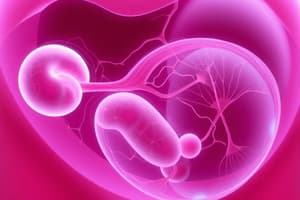Podcast
Questions and Answers
What is the first stage of prenatal development?
What is the first stage of prenatal development?
- Period of the Embryo
- Implantation
- Period of the Zygote (correct)
- Period of the Fetus
The union of the egg and sperm is known as fertilization.
The union of the egg and sperm is known as fertilization.
False (B)
What role do villi play in the development of the placenta?
What role do villi play in the development of the placenta?
They burrow into the uterine wall and help form the placenta.
The structure that encloses the developing organism in amniotic fluid is called the ______.
The structure that encloses the developing organism in amniotic fluid is called the ______.
Match the following stages of prenatal development with their time frame:
Match the following stages of prenatal development with their time frame:
How often is an egg released from the woman's ovaries?
How often is an egg released from the woman's ovaries?
The embryo is particularly vulnerable to developmental issues during the period of the fetus.
The embryo is particularly vulnerable to developmental issues during the period of the fetus.
What happens to the corpus luteum after an egg is released?
What happens to the corpus luteum after an egg is released?
Which layer of the embryonic disk develops into the nervous system and skin?
Which layer of the embryonic disk develops into the nervous system and skin?
The mesoderm develops into the digestive system.
The mesoderm develops into the digestive system.
At what stage does the embryo begin to respond to touch, particularly in the mouth area?
At what stage does the embryo begin to respond to touch, particularly in the mouth area?
The ________ is the longest prenatal period, also known as the 'growth and finishing' phase.
The ________ is the longest prenatal period, also known as the 'growth and finishing' phase.
What substance covers the fetus by the middle of the second trimester?
What substance covers the fetus by the middle of the second trimester?
Match the following stages with their characteristics:
Match the following stages with their characteristics:
What movement can the fetus begin to perform by the end of the third month?
What movement can the fetus begin to perform by the end of the third month?
The heart of the embryo develops separate chambers during the second month.
The heart of the embryo develops separate chambers during the second month.
Flashcards are hidden until you start studying
Study Notes
Reproduction Overview
- Reproduction begins with an egg being released from a woman's ovaries, occurring approximately every 28 days.
- The egg emits a chemical signal to attract sperm as it moves toward the uterus.
- The site of egg release, known as the corpus luteum, produces hormones to prepare the uterine lining for a fertilized egg.
- Conception refers to the union of the egg and sperm.
Pre-Natal Development Stages
- Three distinct periods of pre-natal development are identified:
- Period of the Zygote (Germinal Stage)
- Period of the Embryo (Embryonic Stage)
- Period of the Fetus (Fetal Stage)
Implantation Process
- Implantation occurs between the 7th and 9th days post-conception.
- The blastocyst embeds itself into the uterine lining; the protective outer layer grows rapidly.
- An amnion membrane forms around the developing organism, providing amniotic fluid for temperature regulation.
- Approximately 30% of zygotes do not survive this stage.
Placenta and Umbilical Cord Development
- By the end of the second week, the chorion surrounds the amnion, with villi developing to form the placenta.
- The placenta connects to the developing organism via the umbilical cord, which has one vein for nutrient delivery and two arteries for waste removal.
- The blood flow through the umbilical cord helps prevent tangling around the embryo.
Period of the Embryo (Embryonic Stage)
- Lasts from implantation until the 8th week of pregnancy, marked by rapid prenatal changes.
- All major body structures and internal organs begin forming.
- The embryonic disk differentiates into three layers: ectoderm (nervous system/skin), mesoderm (muscles/bones/circulatory), and endoderm (digestive organs).
- The nervous system forms first; neurons develop within the neural tube.
Development Milestones
- By the end of the 3rd week, significant structures start forming:
- Heart begins circulating blood.
- Muscles, backbone, and digestive tract development begins.
- In the second month, organ development continues, and the embryo reaches about one inch in length and weighs one-seventh of an ounce.
- The embryo begins responding to touch, particularly around the mouth and soles of the feet.
Period of the Fetus (Fetal Stage)
- The fetal stage is known as the "growth and finishing" phase, commencing at the 3rd month.
- Organ systems become structured and interconnected; the fetus exhibits movements such as kicking and thumb-sucking.
- By the 12th week, external genitalia are identifiable, and physical features like fingernails and eyelids develop.
Second Trimester Development
- Between 17 and 20 weeks, fetal movement becomes perceptible to the mother.
- The fetus is covered in vernix, a white cheese-like substance, and lanugo, fine downy hair.
- Extensive organ development occurs, preparing the fetus for life outside the womb.
Studying That Suits You
Use AI to generate personalized quizzes and flashcards to suit your learning preferences.




